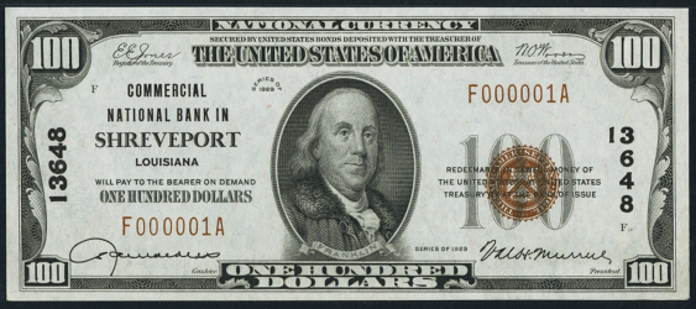One Hundred Dollar Notes › Nationals › 1929 One Hundred Dollar National Bank Notes › Michigan Charters › 1929 $100 Utica Michigan Utica National Bank
Get Value Now
| Item | Info |
|---|---|
| Series | 1929 |
| Charter | #14022 Utica National Bank of Utica, Michigan |
| Year Chartered | 1934, 397 Banks Chartered |
| City Info | Utica is a city in Macomb County in the U.S. state of Michigan. The population was 4,757 at the 2010 census. The city now known as Utica was platted by Joseph Stead in 1829, who preferred to call it "Harlow." Others referred to the city as "Hog's Hollow" or "McDougalville," until a few years later it was finally named Utica by settlers from New York, in honor of the city of the same name in that state. This was common of settlers in this region, and is reflected in the names of nearby cities such as Rochester and Troy that are also named for New York cities. Source: Wikipedia |
| Similar Cities | If your note doesn't match try: 1. Utica, New York - First National Bank 2. Utica, New York - Second National Bank 3. Utica, Ohio - First National Bank 4. Utica, Nebraska - First National Bank 5. Utica, Michigan - First National Bank |
| Seal Varieties | Small Brown |
| See Also | If your note doesn't match try: 1. 1929 $100 Federal Reserve Bank Note 2. 1928 $100 Federal Reserve Note 3. 1928A $100 Federal Reserve Note 4. 1934 $100 Federal Reserve Note 5. 1934A $100 Federal Reserve Note 6. 1934B $100 Federal Reserve Note |
| Other Info | 1. Value depends on notes known for charter, condition and market demand. |
| Neat Fact | Portrait of Franklin. Note appearance similar to 1929 Federal Reserve Bank Notes. |
No Obligations Offers and Appraisals
Please submit a good photo or scan. It will be identified and evaluated. Understand there may be subtle differences between the image you see above and your note. Signatures, design, markings and note condition will determine the offer price. Notes in Uncirculated or better condition receive the best offers.
Appraisals can be estimated for wholesale and retail prices. Wholesale is what dealers typically pay. Retail is what a collector might pay. Retail is slightly higher in most cases.
Please visit this page for USA Paper Money Reference. Do not treat this page as a reference guide, it is for appraisal and acquisition purposes only.
